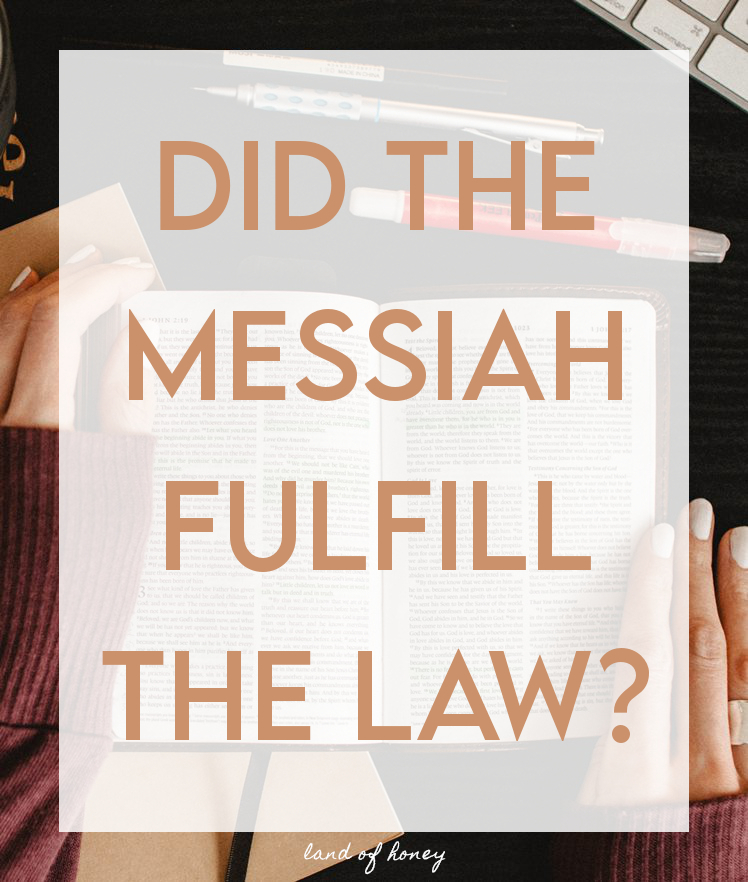Did the Messiah fulfill the law? That's a phrase most of us have heard dozens of times...and with good reason. The Bible says the Messiah came to fulfill the law; this was said by Jesus himself in Matthew 5:17. But it's important to get the implications of that statement correct.
What does the Messiah fulfilled the law mean?
Contrary to popular belief, fulfilling the law doesn't mean getting rid of the law or "doing away with" Biblical law. Many Christians throw the statement, "The Messiah fulfilled the law," at nearly any suggestion of keeping Biblical commandments to mean that since the Messiah did this, we don't need to worry about it anymore. This is usually said to explain why many believers choose to disregard or not honor certain instructions from Scripture. Christianity teaches that the Messiah 'fulfilled' the law by keeping it perfectly, thereby setting us 'free' from some (albeit not all, in Christian thinking) of the commandments. The foundation for this argument is flawed, as much Christian doctrine teaches that the Messiah actually violated the law. This is, of course, not true! You can see posts like this one for more information on that but the takeaway is that Yahusha never broke any of the commandments. If he had, he would have been a sinner (Scripture defines sinning as breaking Biblical commandments), and he would have been disqualified from being our Savior.
But if you look up the word fulfill in any dictionary you will find a different definition than getting rid of something. The first definition is usually given as something like, "to bring into actuality," or "to bring into effect," or "to do something." To me that sounds like the opposite of doing away with something!
Look at the Messiah's words when we understand this word properly:
"Do not think I have come to abolish the law or the Prophets; I have not come to abolish them but to bring them into effect." -Matthew 5:17
or
"I did not come to abolish the law but to do it."
What law did the Messiah fulfill?
It's important to know exactly which law the Messiah was bringing into effect. A lot of people will tell you the Messiah actually taught some sort of New Testament law or His own version of Biblical law, but the context of the law and the Prophets doesn't support this idea. Plus at the time of this statement there was no New Testament. Since He only did what He saw His Father doing, and given the context of the law and the Prophets, the Messiah was referencing the commandments given in the Old Testament.
There are three types of laws in the Bible. Biblical, Levitical, and Jewish.
He's not bringing into effect Jewish laws that are manmade. He spent much of His ministry confronting religious leaders about upholding their own traditions and teachings in place of what Scripture says, so it would make no sense that He would be bringing those into effect.
That leaves us with Biblical law and Levitical law. Since Psalm 110 tells us the Messiah's priesthood is of Melchizedek, and we know that He cannot function as a Levitical priest since He is of the tribe of Judah, it wouldn't make any sense to say that His focus was on Levitical law and cracking down on the standards for animal sacrifice, etc.
That leaves us with Biblical law. These are the laws found in the Old Testament (mostly in Genesis, Exodus, Leviticus, Numbers, and Deuteronomy - also known as the Torah), that give us clear instructions for our behavior. Most of Biblical law relates to how we worship YHWH, how we treat others, regulations for loans and business conduct, instructions for sexual conduct, animals we are not to eat, and instructions for Biblical holidays, including the Sabbath.
Learn more about Biblical law here.
But didn't the Messiah keep the law perfectly so we don't have to anymore?
The Messiah did keep the law perfectly. But the Bible never says that because He did, we don't have to.
Depending on where you live in the world you are subject to specific laws. These encompass everything from driving rules to tax law to workplace regulations to laws against theft. As a citizen, or even a passing visitor, you are expected to keep all of them. Let's say that my dad has flawlessly kept the laws of our state and country for his entire life...having never evaded his taxes, committed a crime, ran a stop sign, etc. Does that mean that because he has perfectly kept these laws, then I don't have to? Of course not! It would be completely absurd for me to commit a crime and tell the police officer, "It's okay for me to do this because my dad has never broken the law."
And what would the police officer think if I used that as an argument? Something like, "If your dad set such a great example, why aren't you more like him? Why aren't you following the same rules?"
Now if I were to get in legal trouble, my dad would be gracious enough to help. If I was given a speeding ticket, he would pay it for me if I couldn't. But just because someone has taken care of my debt doesn't mean it would be wise for me to go out and break traffic laws - why put myself and others at risk from reckless choices? But his actions don't mean the law does not apply to me. Since we all have a spiritual debt we cannot pay, the Messiah lovingly and graciously covered that debt for us with his own life.
Yes, the Messiah kept the law perfectly. He didn't break even the least significant instruction of Scripture. But that doesn't make it okay for us to disregard how He lived. And 1 John 2:6 tells us that if we claim to know Him, we need to walk as He did.
What does Matthew 5:17 mean then?
This passage of Scripture does say that the Messiah came to fulfill the law, but we can see that fulfill doesn't mean "do away with," but rather "to do" or to "bring into effect"! If the meaning of the word fulfill isn't convincing enough, we should also note in this same verse Yahusha says without ambiguity, "Do not think I have come to abolish the law or the Prophets; I have not come to abolish them." The Messiah literally said that He did not come to do away with the the commandments!
This understanding of Matthew 5 fits with the rest of the Messiah's life and the Gospels. We consistently see Him keeping the commandments and defending Biblical law to the religious leaders who were more concerned with their own traditions. He came to show us the way to live, and said He wasn't abolishing Biblical law.
The Messiah fulfilled the law by keeping it, and by keeping it He set the example for how we are to live.
Related posts:
Did the Messiah Break the Law?
Basics of Biblical Law
Commandments or Traditions - Understanding the New Testament













.jpg)






